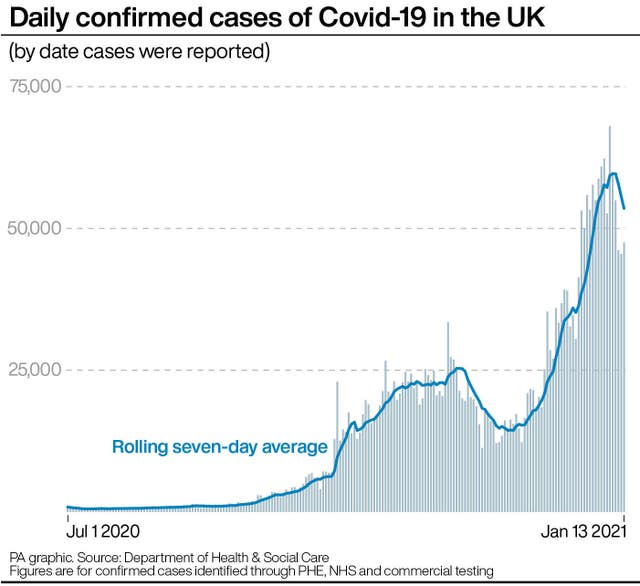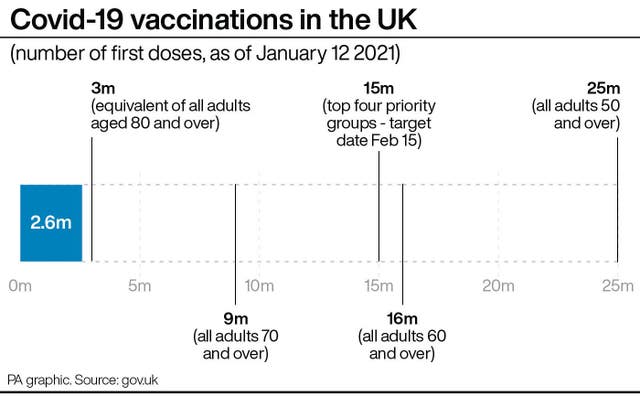Intensive care ‘risks being overwhelmed’ as UK tops 100,000 Covid-related deaths
Boris Johnson said NHS staff were being placed under colossal strain by the pandemic.

Hospital intensive care units (ICUs) face being overwhelmed unless coronavirus rates are brought under control, Boris Johnson admitted.
The Prime Minister said there was a “very substantial” risk that ICUs would be unable to cope if numbers kept increasing.
Mr Johnson’s stark warning came as the daily reported death toll reached a new high, with 1,564 fatalities recorded within 28 days of a positive test.
The latest figures mean the grim milestone of more than 100,000 deaths involving coronavirus has now been passed in the UK, according to official data.
The Prime Minister told MPs: “If you ask me when do we think that the ICU capacity is likely to be overtopped, I can’t give you a prediction for that.
“But all I can say is that the risk is very substantial and we have to keep the pressure off the NHS and the only way to do that is to follow the current lockdown.”
The latest official figures on the coronavirus dashboard show more than 36,000 people are in hospital with coronavirus, including almost 3,500 on ventilation.
Mr Johnson told the Commons Liaison Committee that “the situation is very, very tough indeed in the NHS” and “the strain is colossal” on staff.
The Prime Minister also acknowledged concerns about a new Brazilian variant of coronavirus, although he did not announce a ban on travel from the South American country.
“We already have tough measures… to protect this country from new infections coming in from abroad,” he said.
“We are taking steps to do that in respect of the Brazilian variant.”
The Prime Minister also refused to guarantee that England’s schools will reopen to all pupils after the February half-term, saying it depended on issues such as progress in the vaccination programme or whether vaccine-resistant strains had emerged.
“The priority is obviously to get schools open as soon as possible,” he said.
Earlier, at Prime Minister’s Questions Mr Johnson said vaccinations would take place 24/7 as soon as possible, although supply of doses remained the main barrier.
Meanwhile the NHS said high street pharmacies in England will be able to distribute coronavirus vaccines from Thursday.
Mr Johnson said the process of protecting people from coronavirus is already going “exceptionally fast” but “at the moment the limit is on supply” of the vaccine.
“We will be going to 24/7 as soon as we can,” he told MPs.
Health Secretary Matt Hancock will set out further details “in due course”, Mr Johnson said.
Labour leader Sir Keir Starmer said he understood that pilot 24-hour centres were not yet open to the public but there would be a “huge clamour”.

Mr Hancock earlier questioned whether there would be demand for a round-the-clock vaccination operation as “most people want to get vaccinated in the daytime, and also most people who are doing the vaccinations want to give them in the daytime”.
A YouGov poll of 2,137 British adults found 43% would be willing to have a vaccination appointment between midnight and 5.59am, but 32% would turn it down, while 67% would attend an appointment between 8pm and 9.59pm and 53% would go between 10pm and 11.59pm.
More than 2.6 million people across the UK have so far received a first dose of the coronavirus vaccine.
In Scotland, vaccinations could begin on a 24-hour schedule when mass centres open in late February or early March, the country’s Health Secretary, Jeane Freeman, said.
The Oxford/AstraZeneca vaccine provides the most straightforward route to protect around 15 million of the most vulnerable people by mid-February because it is logistically less complicated than the Pfizer jab, which needs to be kept deep-frozen.
Tom Keith-Roach, president at AstraZeneca UK, said: “We are scaling up very rapidly and this will happen imminently to releasing two million doses a week.”

In other developments:
– A national voucher scheme for free school meals in England will relaunch next week after issues with food parcels for children not in class were highlighted by campaigners including footballer Marcus Rashford and cook Jack Monroe.
– A 20-year-old student who hosted a Covid rule-breaking house party has become one of the first people in the country to pay a £10,000 fine, Nottinghamshire Police said.
– Click-and-collect services will largely end in Scotland, First Minister Nicola Sturgeon announced, to “reduce as far as is possible the reasons people have just now for leaving home”.
– Care home residents and staff across England are expected to be vaccinated by January 24 at the latest, with the majority of jabs administered by the end of this week.
The race to vaccinate millions of people a week comes with deaths and hospital admissions continuing to rise and pressure for a tougher lockdown increasing.
Sir Keir said the current restrictions are “not strong enough” and accused the Prime Minister of being “slow to act”.
Mr Johnson said he would not rule out imposing tougher measures if required.
Along with the record death toll, Wednesday’s figures showed a further 47,525 cases being confirmed by labs.
But Mr Johnson told MPs that – although it is early days – lockdown measures and the Tier 4 restrictions which preceded them “are starting to show signs of some effect”.
Analysis by the PA news agency suggests it is still too soon to say whether the tighter restrictions introduced across England after Christmas have had an impact on the spread of the virus.
Covid-19 case rates are continuing to rise in most regions, with sharp increases across northern England and the Midlands.
The picture in the South and East is less certain, and, while rates may have peaked in some areas it will be several days before a clear trend – either up or down – becomes evident.





